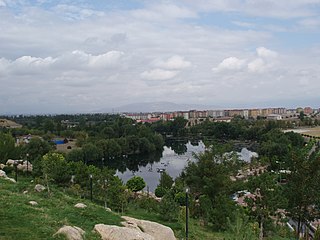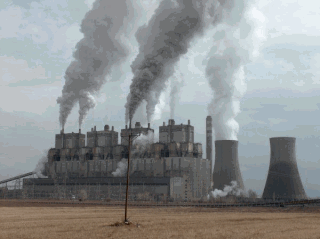
Lignite, often referred to as brown coal, is a soft, brown, combustible, sedimentary rock formed from naturally compressed peat. It is considered the lowest rank of coal due to its relatively low heat content. It has a carbon content around 60–70 percent. It is mined all around the world, is used almost exclusively as a fuel for steam-electric power generation, and is the coal which is most harmful to health.

Elbistan is a district in Kahramanmaraş Province in southern Turkey. Elbistan city center's population is 95,037.
Coal mining regions are significant resource extraction industries in many parts of the world. They provide a large amount of the fossil fuel energy in the world economy.
According to the United States Energy Information Administration (EIA), Pakistan may have over 9 billion barrels (1.4×109 cubic metres) of petroleum oil and 105 trillion cubic feet (3.0 trillion cubic metres) in natural gas (including shale gas) reserves.
The Nigerian Coal Corporation (NCC) is a Nigerian parastatal corporation responsible for mining and selling coal. It is based in Enugu.
Coal mining in India began in 1774 when John Sumner and Suetonius Grant Heatly of the East India Company commenced commercial exploitation in the Raniganj Coalfield along the Western bank of Damodar river. Growth remained slow for nearly a century due to low demand. The introduction of steam locomotives in 1853 boosted demand, and coal production rose to an annual average of 1 million metric tons. India produced 6.12 million metric tons of coal per year by 1900 and 18 million metric tons per year by 1920. Coal production rose steadily over the next few decades, and was boosted by demand caused by World War I. Production slumped in the interwar period, but rose to 30 million metric tons by 1946 largely as a result of World War II.

South Africa produces in excess of 255 million tonnes of coal and consumes almost three quarters of that domestically. Around 77% of South Africa's energy needs are directly derived from coal and 92% of coal consumed on the African continent is produced in South Africa.
The Thar coalfield is located in Thar Desert, Tharparkar District of Sindh province in Pakistan. The deposits—16th-largest coal reserves in the world, were discovered in 1991 by Geological Survey of Pakistan (GSP) and the United States Agency for International Development.
South Eastern Coalfields Limited (SECL) is the largest coal producing company of India. It is a "Miniratna" Company, and one of eight fully owned subsidiaries of Coal India Limited. The company has its headquarter at Bilaspur, Chhattisgarh, India and 92 mines spread over Chhattisgarh & Madhya Pradesh; 70 underground, 21 opencast, and 1 mixed. It is a schedule 'B' Mini Ratna CPSE in coal & lignite under the administrative control of Ministry of Coal

Turkey consumes 1700 terawatt hours (TW/h) of primary energy per year, a little over 20 megawatt hours (MW/h) per person. 88% of energy is fossil fuels and the policy includes reducing fossil fuel imports, including by generating more electricity in the west to match demand.
The Electricity Generation Company is the largest electric power company in Turkey. Owned by the government it produces and trades electricity throughout the country.
Karapınar coalfield is a coalfield in Konya Province in Turkey. The coalfield has reserves of 1.8 billion tonnes of lignite.
Kışlaköy Coal Mine is a lignite mine in Elbistan coalfield and is the largest operating lignite mine in Turkey.
Deniş Coal Mine is a lignite mine located in the Manisa Province in Turkey and is owned by the state lignite company TKİ.
Soma power station is a 990 MW coal-fired power station in Soma, Manisa in western Turkey.

A quarter of Turkey's primary energy use is coal: the heavily subsidized industry generates a third of the country’s electricity, emits a third of Turkey's greenhouse gases and employs 35,300 people. Every year thousands of people die prematurely due to coal.
Afşin-Elbistan B power station is a 1440MW coal-fired power station in Afşin in Kahramanmaraş Province in Turkey state owned by EÜAŞ.

Afşin-Elbistan A power station is a 1355MW coal-fired power station in Afşin in Kahramanmaraş Province in Turkey owned by Çelikler Holding.







